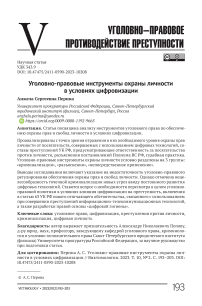Уголовно-правовые инструменты охраны личности в условиях цифровизации
Автор: Перина А. С.
Журнал: Виктимология @victimologiy
Рубрика: Уголовно-правовое противодействие преступности
Статья в выпуске: 2 т.10, 2023 года.
Бесплатный доступ
Статья посвящена анализу инструментов уголовного права по обеспечению охраны прав и свобод личности в условиях цифровизации. Проанализированы с точки зрения отражения в них необходимого уровня охраны прав личности от посягательств, совершаемых с использованием цифровых технологий, составы преступлений УК РФ, предусматривающие ответственность за посягательства против личности, разъяснения постановлений Пленума ВС РФ, судебная практика. Уголовно-правовые инструменты охраны личности условно разделены на 3 группы: «криминализация», «разъяснения», «непосредственное применение». Выводы исследования включают указание на недостаточность уголовно-правового регулирования обеспечения охраны прав и свобод личности. Однако отмечена нецелесообразность точечной криминализации новых угроз ввиду постоянного развития цифровых технологий. Ставится вопрос о необходимости пересмотра в целом уголовно-правовой политики в условиях влияния цифровизации на преступность, включения в статью 63 УК РФ нового отягчающего обстоятельства, связанного с использованием при совершении преступлений информационно-телекоммуникационных технологий, а также разработки правой основы «цифровой гигиены».
Уголовное право, цифровизация, преступления против личности, криминализация, цифровая личность
Короткий адрес: https://sciup.org/14128044
IDR: 14128044 | DOI: 10.47475/2411-0590-2023-10208
Список литературы Уголовно-правовые инструменты охраны личности в условиях цифровизации
- Amirova DK, Kunicyna YuV. On the issue of criminalizing cyberbullying. Uchenye zapiski Kazanskogo yuridicheskogo instituta MVD Rossii [Scientific Notes of the Kazan Law Institute of MIA of Russia]. 2022;7(1):12-16. (In Russ.)
- Artyushina OV. Novels of the Criminal Code of the Russian Federation of Counteraction to Activity, Directed at Adolescents to Suicidal Behavior. Vestnik Kazanskogo yuridicheskogo instituta MVD Rossii[Scientific Notes of the Kazan Law Institute of MIA of Russia]. 2017;8(3):85-92. (In Russ.) DOI: https://doi.org/10.24420/KUI.2017.3(29).7374.
- Bochaver AA, Hlomov KD. Cyberbullying: Harassment in the Space of Modern Technologies. Psihologiya. ZHurnal Vysshej shkoly ekonomiki [Psychology. Journal of the Higher School of Economics]. 2014;11(3):177-191. (In Russ.)
- Gorshenin AA, Dubenskij IV. Protection of privacy on the Internet. Molodoj uchenyj [Young scientist]. 2018;(19): 279-282. (In Russ.)
- Dyumaeva S. Is the number of teenage suicides really growing? The Village. 2017. (In Russ.) Available at: https://www.the-village.ru/village/city/asking-question/258242-suicide (accessed: 16.04.2023).
- Korobeev AI, Dremlyuga RI, Kuchina YaO. Cybercrimes in the Russian Federation: criminological and criminal law analysis of the situation. Vserossijskij kriminologicheskij zhurnal [Russian Journal of Criminology]. 2019;13(3): 416-425. (In Russ.) DOI: https://doi.org/10.17150/2500-4255.2019.13(3).416-425.
- Kochoi SM. Criminal Law Risks when Using Unmanned Vehicles. Aktual’nye problemy rossijskogo prava [Actual Problems of Russian Law].2021;16(7):125-135. (In Russ.) DOI: https://doi.org/10.17803/1994-1471.2021.128.7.125-135.
- Mal’ceva VA. Children’s protection from cyberbullying: issues of criminal-legal regulation. Zakon i parvo [Law and Legislation]. 2019;(10): 95-99. (In Russ.) DOI: https://doi.org/10.24411/2073-3313-2019-10463.
- Mamonova YuA. CHastnaya zhizn’ kak ob”ekt antikriminal’noj bezopasnosti: monografiya [Private life as an object of anti-criminal security]: [monograph]. Moscow : Jurlitinform; 2014. 199 p. (In Russ.)
- Ovchinskij VS. Kriminologiya cifrovogo mira [Criminology of the digital world]: [textbook]. Moscow: Norma: INFRA-M, 2018. 352 p. (In Russ.)
- Sirik MS, Loba VE, Moshkin SV. Problems of the qualification of the crime provided by article 151.2 of the Criminal Code of the Russian Federation. Pravo i gosudarstvo: teoriya i praktika [Law and State: The Theory and Practice]. 2020;(10):103-105. (In Russ.) DOI: https://doi.org/10.47643/1815-1337_2020_10_103.
- Soldatova GU. Cifrovoe pokolenie Rossii: kompetentnost’ i bezopasnost’[The Digital generation of Russia: competence and security]: [monograph]. G. U. Soldatova, E. I. Rasskazova, T. A. Nestik. Moscow: Smysl; 2017. 375 p. (In Russ.)
- Cherkasenko OS. The phenomenon of cyberbullying in adolescence. Lichnost’, sem’ya i obshchestvo: voprosy pedagogiki i psihologii [Personality, family and society: questions of pedagogy and psychology]. 2015;(53): 91-94. (In Russ.)
- Chuchaev AI, Gracheva YuV., Malikov SV. Digitalisation and its criminal-legal risks. Pravosudie [Justice]. 2019;1(2):133-155. (In Russ.) DOI: https://doi.org/10.17238/issn2686-9241.2019.2.133-155.
- Sharapov RD, Didrih MP. The issues of qualification of crimes against minors’ life committed with the use of the Internet. Elektronnoe prilozhenie k Rossijskomu yuridicheskomu zhurnalu [Electronic supplement to «Russian Juridical Journal»]. 2017;(6): 81-90. (In Russ.)
- Shevko NR, Chitaya ZI. Problems of determining the objective side of crimes committed using modern information technologies. Vestnik Kazanskogo yuridicheskogo instituta MVD Rossii [Scientific Notes of the Kazan Law Institute of MIA of Russia]. 2016;(3):75-77. (In Russ.)
- Shutova AA. Current trends in the use of information and telecommunications network in the process of committing a crime. Probely v rossijskom zakonodatel’stve [Gaps in Russian Legislation]. 2015;(4):205–208. (In Russ.)


